

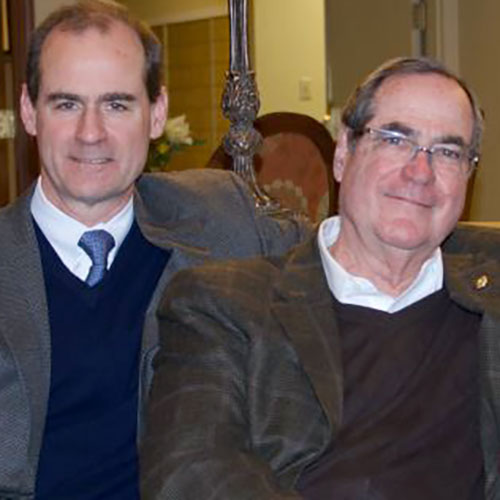
His father’s passion for his work and dedication to his patients eventually inspired David J. Winchester, MD to pursue his own career as a surgical oncologist.
A pivotal line in the 2002 movie The Rookie says: It’s ok to think about what you want to do until it’s time to start doing what you were meant to do.
During his years in high school and college, David J. Winchester, MD, had thought long and hard about what he was meant to do with his life. And, for a time, it certainly wasn’t being a doctor.
His father, David P. Winchester, MD, was an outstanding and distinguished surgeon in the Chicago area. But his success came at a cost. Long hours. Late nights. Missed ballgames.
“We waited for dinner sometimes ‘til eight or nine at night,” the younger Dr. Winchester says. “My mom wanted to wait until we could have dinner as a family. I was hungry and tired and had to get up for school the next day. There was an occasional resentment there that slightly tempered my enthusiasm for medicine.”
But when the time came to find his own path in life, young David made what he called the “logical” choice. In the end, it was his father’s passion for his work, his dedication to his patients and an acknowledgement that he had the skills and the aptitude to be a surgeon himself.
“Being a doctor seemed like a good choice because it fit my abilities and my personality,” he says. “I did well in math and science in college and high school, and I like doing things with my hands. So, it seemed like a logical thing. My father, I thought, was a great role model. He was so passionate, and he loved his work.”
David J. Winchester was born in Chicago, Illinois, and lives near his hometown today. But he’s hardly a homebody. His father was drafted during the Vietnam War, and home became wherever the Army sent them. When young David was 10, the family ended up in Houston, Texas, where his father trained as a surgical oncologist.
Life was good there, he says. The family lived on a large piece of land that had a “pond and pine groves and horses and frogs and turtles and snakes,” he says. “So, I love that stuff, and I had some nice friends there.”
But soon, when David J. was in eighth grade, the family was on the move again, this time back to Illinois. They moved again to a nearby neighborhood just as he was starting high school.
“Moving back and forth and then moving right when I started high school was hard,” he says. “That was what I was used to doing, but I think it affected me perhaps socially. I mean, I didn't really have childhood friends I could relate to, like a lot of people do. So, I was kind of a loner in some respects.”
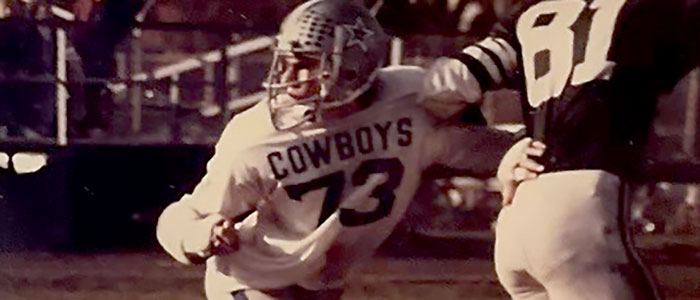
Stability in an enabler. It helps to eliminate distractions and allows for firm footing from which you can better accelerate forward.
Once the Winchester family settled in Illinois, David J. found that stability, and his life began to bloom—especially after, with the encouragement of his godfather and the family doctor, he turned to sports.
“It all changed in high school,” he says. “I found my circle of friends and became an athlete and succeeded.”
David J.’s godfather, Joe Ruklick, his father’s college roommate at Northwestern University, encouraged him to take up basketball. Tall and lithe, David J. had the frame for the sport, but he’d never played organized basketball.
Turns out Ruklick knew a thing or two about the game. The 6-foot-9-inch Ruklick was selected out of Northwestern by the then-Philadelphia Warriors in the 1959 NBA draft. In the waning seconds of a game on March 2, 1962, Ruklick got the assist on Wilt Chamberlain’s last bucket in his historic 100-point game.
“Joe Ruklick was always very encouraging,” David J. says. “He was always a very positive force in my life. He was my inspiration to be a basketball player. But I never played organized sports until high school, so that was a huge disadvantage.”
Ruklick also coined David J.’s nickname, DJ, to help differentiate him from David P. “And it stuck,” David J. says.
“I showed up in my pediatrician’s office for my pre-high school physical, and he said, ‘You should play football. You’ll love it,’” David J. says. “He seemed like a smart guy, so I tried out for the team, and I made it. He had a huge influence on my life, my doctor.”
After a slow start, David J. began to blossom in sports, playing basketball, football and lacrosse at New Trier High School, north of Chicago. He also excelled academically.
“I was very focused on achieving, getting good grades and getting into a good college,” he says. “That became important to me once I was in school.”
And it was in high school that this one-time loner also found his forever girl, his wife Doris, during a gathering of friends.
“She showed up with my friend's sister,” he says. “I said, ‘Who are you?’ And she said her name was Doris. And I said, ‘Where you from?’ She said, ‘I go to your high school.’ She knew me, but I didn't know her.”
Today, David and Doris have been married 39 years and have four children.
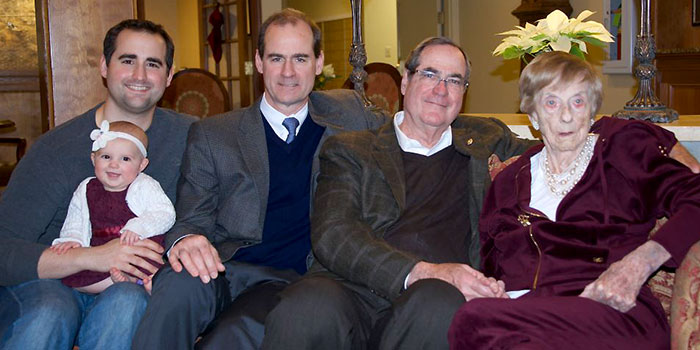
Five generations of Winchesters: David J.'s grandmother was 99 when this photo was taken in 2014. She passed away six weeks later.
The elder Dr. Winchester’s distinguished medical career dates back to the 1960s, when he served as a captain in the U.S. Army Medical Corp in Vietnam. He’s held leadership roles in multiple professional organizations, has been honored with dozens of awards, taught many surgeons as a professor and mentor and wrote or contributed to scores of professional journals and books.
In 2021, he was awarded the American College of Surgeons (ACS) Distinguished Service Award, the organization’s highest honor.
“Dr. Winchester is considered a natural leader, who possesses integrity, vision, and a steadfast commitment to the College’s initiatives and principles,” his citation reads. “He serves as a role model to surgeons everywhere ‘to always do the right thing for patients.’”
It was a career that almost didn’t happen.
David J. was 6 years old when he, his two younger sisters, paternal grandmother and pregnant mother bid a tearful goodbye to his father as he was shipped off to Vietnam for a seven-month deployment.
“He was shaving outside his tent, holding a small mirror, when a bullet shattered the glass,” David J. says. “He didn’t tell us that story until a few years ago. We were very fortunate.”
Little did he know then that his father’s safe return and successful career would eventually create a path for his own future.
“I had to decide what I wanted to do,” David J. says. “I wasn’t sure what I was going to do in college because I had seen my father’s lifestyle, which was very demanding and frustrating for a high school student to watch.”
In the end, it was his father’s passion for his practice and dedication to his patients that tipped the scale in young David’s decision. David P. says he knew it all along.
“I do believe that there are certain traits in my son’s growing-up life that gave me a hint that he would do well in surgery,” the elder Dr. Winchester said in a 2021 article in the ACS Bulletin. “He was athletic. He had good hands. He was very thoughtful and smart. And I thought he had the stuff to make a very good surgeon. I didn’t tell him that at the time, but he had all those things.”
Pretty soon, family dinners became a time for father and son to bond.
“David and I actually unknowingly became isolated at the dinner table at one end and talked business,” David P told the ACS Bulletin. “I drilled him with questions about general surgery and what he should do, and he answered them. And we sort of were isolated from the rest of the family, but not in a negative way. It just was the way it happened.”
Father and son performed many surgical procedures together and have even been assisted by David J.’s sister Diane, a surgical nurse. “She's a fantastic nurse,” David J. says. “I love working with my sister.”
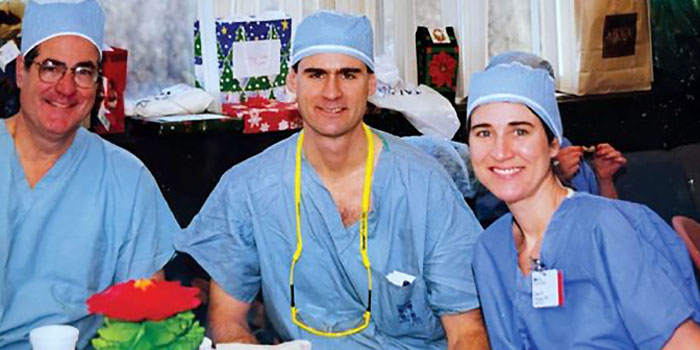
Both Davids attended Northwestern University Medical School, were fellows at M.D. Anderson and were on Staff at Evanston Hospital. When David J. was a resident at the Northwestern University Feinberg School of Medicine, his father was a Professor of Surgery.
But young David was no “nepo baby.” He soon blazed his own trail, adapting to new technology and adopting innovative techniques and in short time, also became Professor of Surgery at Northwestern and subsequently Clinical Professor at the University of Chicago.
“At some point, when I was an attending surgeon, I was teaching him more than he was teaching me,” David J. says. “He taught me a lot with his experience and his judgment. But I would teach him new things and introduce new techniques. Ironically, it seems like the roles switched at a certain point.”
With a long, stellar career as an accomplished surgeon, Dr. David P. Winchester cast a large shadow, one that may have easily enveloped a son or daughter who chose the same path.
But Dr. David J. Winchester has long stepped out from that shadow and earned his own reputation as a groundbreaking surgeon. The younger Dr. Winchester is a member of numerous professional organizations, including the Society of Surgical Oncology and the American Surgical Association. He serves on the Executive Committee of the American Joint Committee on Cancer and has contributed to more than 135 publications.
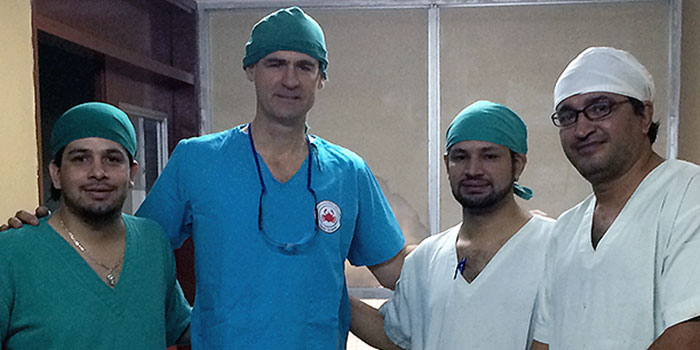
He's also become a teacher and mentor to others. He’s traveled the world—China, Eastern Europe, Latin America—with organizations, such as Health Volunteers Overseas, to treat cancer patients who may not have otherwise received treatment and to teach doctors abroad new techniques.
“Cancer patients are the same no matter where you are in the world, “ he says. “It's so great to share knowledge in places where they don't do things the way they should. It's great to take care of patients, but it's so wonderful to improve the knowledge base beyond our borders so that we can help treat thousands of patients.”